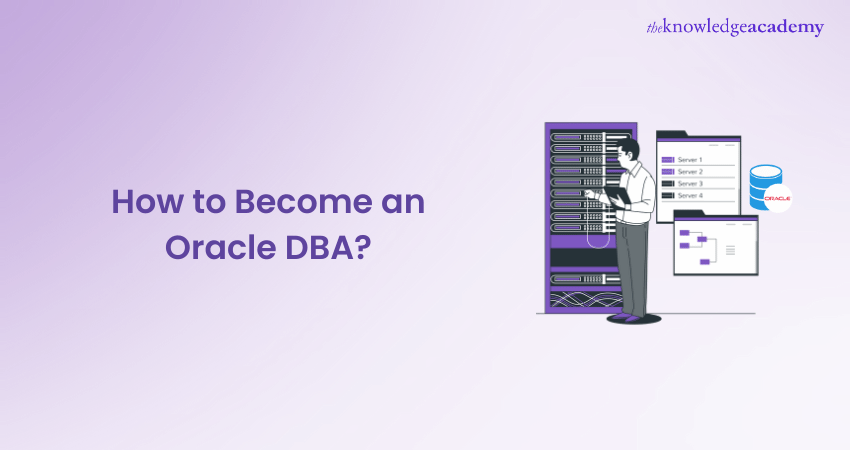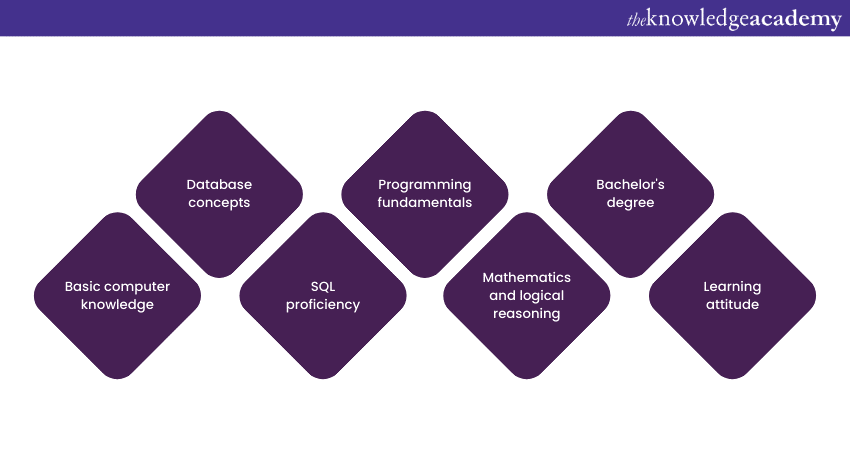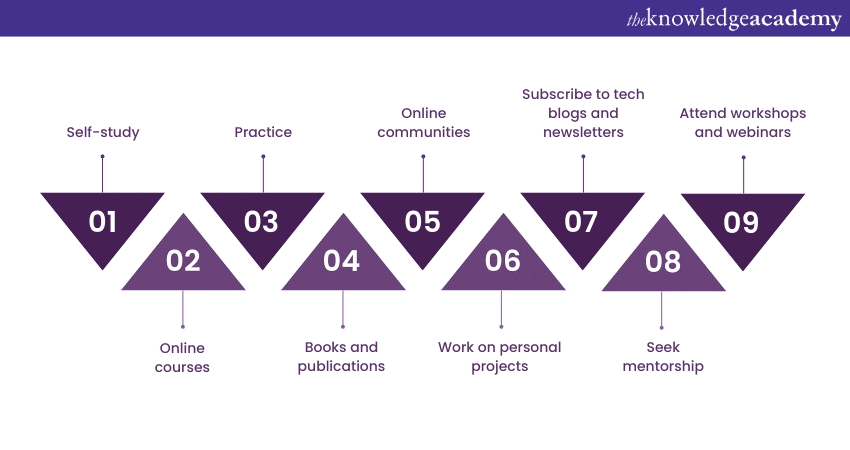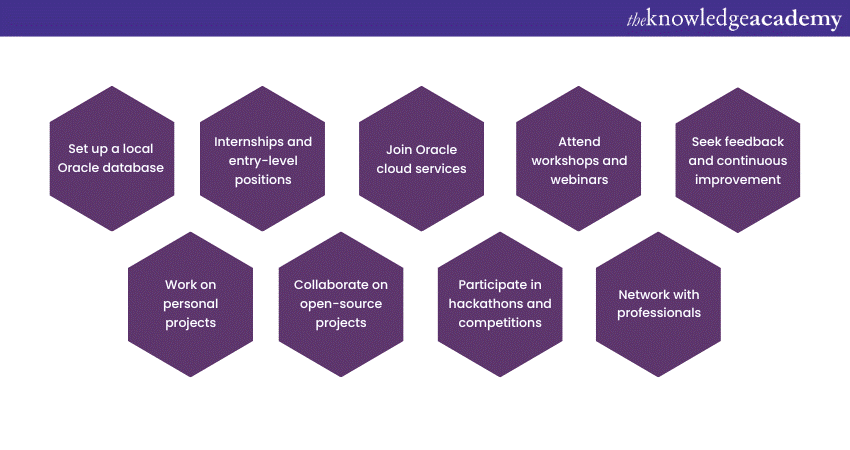We may not have the course you’re looking for. If you enquire or give us a call on +40 316317743 and speak to our training experts, we may still be able to help with your training requirements.
Training Outcomes Within Your Budget!
We ensure quality, budget-alignment, and timely delivery by our expert instructors.

Becoming an Oracle Database Administrator (DBA) is a rewarding journey for individuals passionate about managing critical data systems. As organisations rely heavily on data to drive their decision-making processes, the demand for skilled Oracle DBAs continues to grow. But the question, though, is How to Become an Oracle DBA?
According to Glassdoor, the average pay of an Oracle DBA in the UK is about £43,323 annually. So, it is a promising career with lots of benefits. If you are interested in pursuing this career and willing to revolutionise the world of Database Management Systems, then this blog is for you. Read this blog to learn about How to Become an Oracle DBA, including the role of an Oracle DBA, how to acquire Oracle skills and knowledge and more.
Table of Contents
1) Understanding the role of an Oracle DBA
2) Essential prerequisites to becoming a DBA
3) How to acquire Oracle Database knowledge?
4) Mastering Oracle DBA Skills
5) Gaining practical experience
6) Conclusion
Understanding the role of an Oracle DBA
Before understanding How to Become an Oracle Database Administrator, it's crucial to grasp the responsibilities and significance of this role. An Oracle DBA is a skilled professional responsible for the following:
a) Installation
b) Configuration
c) Maintenance
d) Overall management of Database Systems
e) Data security
f) Optimise database performance
g) Troubleshoot issues
h) Work closely with developers and stakeholders to support business-critical applications
Essential prerequisites to becoming a DBA
Before delving into the journey of How to Become a DBA, it's essential to meet certain prerequisites. Meeting them can ensure a smooth learning process and a successful career path. These prerequisites can lay a solid foundation for your DBA endeavours. Let's explore these key requirements

1) Basic computer knowledge: Having a fundamental understanding of computers, operating systems, and file management is crucial. Knowledge of concepts such as file systems, directories, and basic command-line operations is also beneficial in working with Oracle databases.
2) Database concepts: Familiarise yourself with general database concepts such as data models, tables, Oracle Data Types, and relationships. Understanding the principles of Database Management can help you grasp Oracle-specific concepts more effectively.
3) SQL proficiency: SQL (Structured Query Language) is the language used to communicate with relational databases like Oracle. Ensure you have a good grasp of SQL queries, including SELECT, INSERT, UPDATE, and DELETE statements. This knowledge can be fundamental to interacting with Oracle databases.
4) Programming fundamentals: While not mandatory, having some programming knowledge can be advantageous. Familiarity with programming languages like Python, Java, or PL/SQL (Oracle's procedural language extension of SQL) can aid in automating tasks and improve your problem-solving capabilities.
5) Mathematics and logical reasoning: A basic understanding of mathematics and logical reasoning is valuable in managing and optimising databases efficiently. Concepts such as algebra, statistics, and logical operations can aid in data analysis and performance tuning.
6) Bachelor's degree: While it's possible to become an Oracle DBA without a formal degree, a bachelor's degree in a related field can be an asset. It demonstrates a level of commitment and can open doors to more advanced positions and career opportunities.
7) Learning attitude: Perhaps the most crucial prerequisite is a willingness to learn and adapt. The field of Oracle Database Administration is ever-evolving, with new features and technologies introduced regularly. Being open to continuous learning and self-improvement is essential for long-term success as an Oracle DBA.
Elevate your database expertise with our Oracle Training – Sign up now!
How to acquire Oracle Database knowledge?
In order to become a proficient Oracle Database Administrator (DBA), gaining a comprehensive understanding of Oracle Databases is crucial. Below are effective strategies on How to Become an Oracle DBA by acquiring the necessary knowledge:

1) Self-study: Start your journey by exploring online tutorials, official Oracle documentation, and reputable resources. Learn about the fundamentals of Oracle Databases, including their architecture, data structures, and key features.
2) Online courses: You can participate in structured online courses that specifically focus on Oracle Database Administration. These DBA courses often offer hands-on exercises and real-world scenarios, allowing you to apply your knowledge in practical situations.
3) Practice: Create a local database environment or leverage Oracle's cloud services to gain hands-on experience. Practice Database Management tasks regularly to familiarise yourself with the Oracle environment and build confidence in handling different scenarios.
4) Books and publications: Read books and publications authored by experienced Oracle DBAs. These resources can offer valuable insights and best practices, helping you deepen your understanding of Oracle Database concepts.
5) Online communities: Join Oracle DBA forums, discussion groups, and social media communities to interact with like-minded individuals and industry experts. Engaging in discussions and asking questions can provide valuable knowledge and support.
6) Work on personal projects: Undertake personal database projects that challenge your skills and understanding as a DBA. Building and managing a database system for a specific use case can enhance your problem-solving abilities and creativity.
7) Subscribe to tech blogs and newsletters: Stay updated with the latest developments in Oracle technology by subscribing to technology blogs and newsletters. Regularly reading industry updates can broaden your knowledge base.
8) Seek mentorship: Connect with experienced Oracle DBAs and seek mentorship opportunities. A mentor can offer personalised guidance, share valuable experiences, and provide career advice.
9) Attend workshops and webinars: Participate in DBA workshops and webinars hosted by reputable training providers. These events often cover advanced topics and emerging trends in Oracle database administration.
Unlock the Potential of Oracle 18c with our Oracle Database 18c Administration Training – Sign up now!
Mastering Oracle DBA Skills
As an aspiring DBA, mastering essential skills is crucial for success in this challenging and rewarding field. Below are the key skills required to become an Oracle DBA:
a) Database installation and configuration:
1) Learn how to install and configure database software on various operating systems and hardware platforms. This is crucial for becoming a DBA.
2) As a DBA, you should understand the different configuration options and parameters. This is essential to optimise performance and meet specific business requirements.
b) Database backup and recovery:
1) Master various backup and recovery strategies, including full, incremental, and point-in-time recovery.
2) Practice restoring databases to different points in time to ensure data integrity and business continuity.
c) Performance tuning:
1) In order to become a DBA, you should acquire skills in performance monitoring and optimisation. This will help to identify and resolve bottlenecks.
2) Learn techniques to optimise SQL queries, manage indexes, and fine-tune memory and storage configurations.
d) Security management:
1) As a DBA, you should familiarise yourself with security features and best practices for securing sensitive data.
2) You should know how to implement access controls, encryption, and auditing to protect the database from unauthorised access and ensure compliance with regulations.
e) High availability and disaster recovery:
1) Explore Oracle's high availability solutions like Oracle Real Application Clusters (RAC) and Data Guard.
2) Understand how to configure and manage these solutions to minimise downtime and maintain database availability during failures.
f) Database monitoring and troubleshooting:
1) In order to become a DBA, you should learn to proactively monitor the database for performance issues, errors, and anomalies.
2) Develop troubleshooting skills to quickly diagnose and resolve database-related problems.
g) Automation and scripting:
1) Acquire proficiency in scripting languages like SQL*Plus and PL/SQL to automate routine tasks.
2) Implement scripts for tasks such as database backups, performance monitoring, and report generation.
h) Disaster recovery planning:
1) Understand the significance of disaster recovery planning and develop strategies to recover from catastrophic events.
2) Test and validate your disaster recovery plans regularly to ensure they are effective and reliable.
i) Collaboration and communication:
1) Develop strong communication skills to work effectively with developers, stakeholders, and other IT teams.
2) Collaborate with application developers to optimise database design and performance.
j) Continuous learning:
1) Stay updated with the latest advancements in Oracle DBA technologies and best practices.
2) Participate in workshops, seminars, and training programs to expand your knowledge and skills.
Discover the power of data with our Oracle SQL Fundamentals Course – Register now!
Gaining practical experience
Practical experience is a crucial aspect of learning How to Become an Oracle DBA. It not only reinforces the theoretical knowledge gained from studying but also provides invaluable real-world skills. Here are some effective ways to gain practical experience as an Oracle DBA:

1) Set up a local Oracle Database: Install Oracle Database software on your local machine or a virtual environment. Create test databases and practice various administrative tasks, such as database creation, user management, and configuration.
2) Work on personal projects: Undertake personal database projects to apply your skills to real-world scenarios. Design and implement databases for personal use or small applications to gain hands-on experience.
3) Internships and entry-level positions: Look for DBA internships or entry-level positions at companies that use databases. These positions allow you to work under experienced DBAs, learn from their expertise, and gain practical insights into database management.
4) Collaborate on open-source projects: Contribute to open-source database projects or DBA-related communities. Engaging in DBA collaborative projects exposes you to different perspectives and best practices while building your portfolio.
5) Join Oracle cloud services: Leverage Oracle's cloud services to practice and experiment with their database technologies. It offers various free-tier options to set up and manage databases without incurring significant costs.
6) Participate in hackathons and competitions: Engage in DBA-related hackathons and competitions to showcase your skills and creativity. These events challenge you to find innovative solutions and improve your problem-solving abilities.
7) Attend workshops and webinars: Participate in workshops and webinars conducted by reputable training providers. These events often include hands-on labs and practical exercises to sharpen your skills.
8) Network with professionals: Connect with Oracle DBAs and other IT professionals in your network or through social media platforms like LinkedIn. Networking can lead to opportunities for mentorship, collaboration, and potential job referrals.
9) Seek feedback and continuous improvement: Seek feedback on your projects and performance from experienced Oracle DBAs. Use feedback constructively to find areas for improvement and work on enhancing your skills.
Master performance tuning with our Oracle Database DBA Performance Tuning & Management Training – Sign up today!
Conclusion
We hope this blog answered the question – How to Become an Oracle DBA? Becoming an accomplished Oracle DBA requires dedication, continuous learning, and hands-on experience. By mastering technical skills, seeking practical exposure, and staying updated, you can excel in this ever-evolving field and contribute significantly to data-driven success.
Frequently Asked Questions
Upcoming IT Infrastructure & Networking Resources Batches & Dates
Date
 Oracle Database 19c Administration Training
Oracle Database 19c Administration Training
Mon 16th Dec 2024
Mon 20th Jan 2025
Mon 24th Mar 2025
Mon 12th May 2025
Mon 28th Jul 2025
Mon 20th Oct 2025
Mon 15th Dec 2025







 Top Rated Course
Top Rated Course



 If you wish to make any changes to your course, please
If you wish to make any changes to your course, please


